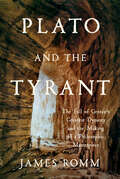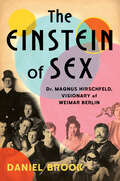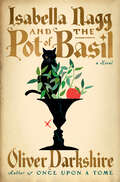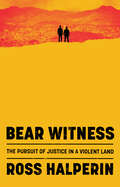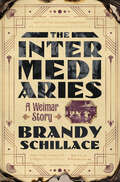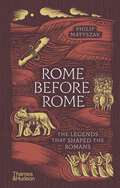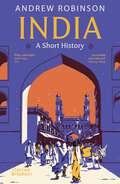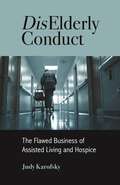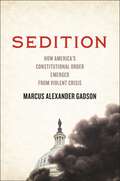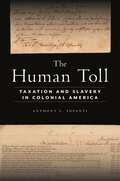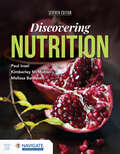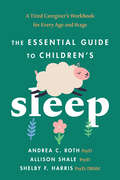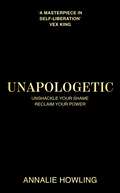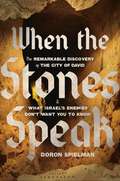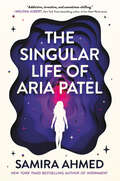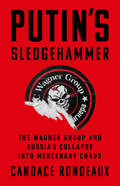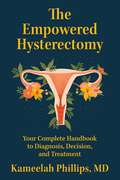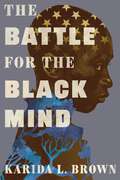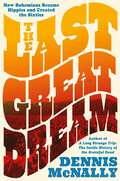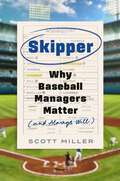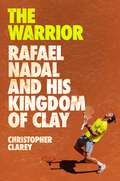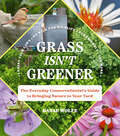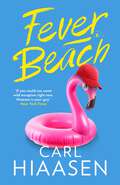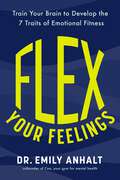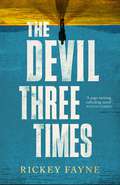- Table View
- List View
Plato and the Tyrant: The Fall of Greece's Greatest Dynasty and the Making of a Philosophic Masterpiece
by James RommFrom an eminent historian and classicist, an incisive portrait of the philosopher Plato, showing how the ideas in his masterwork, Republic, were tested by violent events in the most powerful Greek city of the era. Plato is one of history’s most influential thinkers, the “sublime philosopher” whose writings remain foundational to Western culture. He is known for the brilliant dialogues in which he depicted his teacher, Socrates, discussing ethical truths with prominent citizens of Athens. Yet the image we have of Plato—an ethereal figure far removed from society and politics, who conjured abstract ideas in peaceful groves—is a fiction, created by Plato’s admirers and built up over centuries. In fact, Plato was very much a man of the world. In Plato and the Tyrant, acclaimed historian and classicist James Romm draws on personal letters of Plato—documents that have long been kept in obscurity—to show how a philosopher helped topple the leading Greek power of the era: the opulent city of Syracuse. There, Plato encountered two authoritarian rulers, a father and son both named Dionysius, and tried to steer them toward philosophy. At the same time, he worked on his masterpiece, Republic, in which he conceived a ruler who unites perfect wisdom with absolute power. That dream has echoed down through the ages and given rise to a famous term, one that Plato himself didn’t actually use: philosopher-king. As Romm reveals, Plato’s time in Syracuse helped shape Republic—and also had disastrous results for Plato himself and for all of Greek Sicily. The younger Dionysius, emotionally unstable but intellectually curious, welcomed Plato with open arms, but soon the relationship soured. Plato’s close friendship with Dionysius’s uncle, Dion—possibly a bond of romantic love—created a rift in the ruling family that led to a chaotic civil war. Combining thrilling political drama with explorations of Plato’s most cherished ideas, Romm takes us into the heart of Greece’s late classical age, a time when many believed that democracy had failed. Plato’s search for solutions led him to write his fervent plea for a new political order, and also led him to a place where he believed his theories might be put into practice. But Plato and the Tyrant demonstrates how Plato’s experiment with enlightened autocracy spiraled into catastrophe, and also gives us nothing less than a new account of the origins of Western political thought.
The Einstein of Sex: Dr. Magnus Hirschfeld, Visionary of Weimar Berlin
by Daniel BrookAn illuminating portrait of a lost thinker, German-Jewish sexologist and activist Magnus Hirschfeld. More than a century ago, Dr. Magnus Hirschfeld, dubbed the “Einstein of Sex,” grew famous (and infamous) for his liberating theory of sexual relativity. Today, he’s been largely forgotten. Journalist Daniel Brook retraces Hirschfeld’s rollicking life and reinvigorates his legacy, recovering one of the great visionaries of the twentieth century. In an era when gay sex was a crime and gender roles rigid, Hirschfeld taught that each of us is their own unique mixture of masculinity and femininity. Through his public advocacy for gay rights and his private counseling of patients toward self-acceptance, he became the intellectual impresario of Berlin’s cabaret scene and helped turn his hometown into the world’s queer capital. But he also enraged the Nazis, who ransacked his Institute for Sexual Science and burned his books Driven from his homeland, Hirschfeld traveled to America, Asia, and the Middle East to research sexuality on a global scale. Through his harrowing lived experience of antisemitic persecution and a pivotal late-in-life interracial romance, he came to see that race, like gender, was a human invention. Hirschfeld spent his final years in exile trying to warn the world of the genocidal dangers of racism. Rich in passion and intellect, The Einstein of Sex at last brings together this unsung icon’s work on sexuality, gender, and race and recovers the visionary who first saw beyond the binaries. A century after his groundbreaking work—as the fights for personal freedom and societal acceptance rage on—Hirschfeld’s gift for thinking beyond the confines of his world has much to teach us
Isabella Nagg and the Pot of Basil: A Novel
by Oliver DarkshireA hilarious and surprisingly moving cozy fantasy novel from the best-selling author of Once Upon a Tome. In a tiny farm on the edge of the miserable village of East Grasby, Isabella Nagg is trying to get on with her tiny, miserable existence. Dividing her time between tolerating her feckless husband, caring for the farm’s strange animals, cooking up “scrunge,” and crooning over her treasured pot of basil, Isabella can’t help but think that there might be something more to life. When Mr. Nagg returns home with a spell book purloined from the local wizard, she thinks: what harm could a little magic do? This debut novel by beloved rare bookseller and memoirist Oliver Darkshire reimagines a heroine of Boccaccio’s Decameron in a delightfully deranged world of talking plants, walking corpses, sentient animals, and shape-shifting sorcerers. As Isabella and her grouchy, cat-like companion set off to save the village from an entrepreneurial villain running a goblin-fruit Ponzi scheme, Darkshire’s tale revels in the ancient books and arcane folklore of a new and original kind of enchantment. A delightful and entertaining story of self-discovery—as well as fungus, capitalism, and sorcery—Isabella Nagg and the Pot of Basil is a story for those who can’t help but find magic even in the oddest and most baffling circumstances.
Bear Witness: The Pursuit of Justice in a Violent Land
by Ross HalperinA high-octane true-crime story, Bear Witness follows two Christians who refuse to let fear or conventional wisdom stand in the way of their altruistic mission. The vast majority of Hondurans would have never dared to set foot in Nueva Suyapa, a mountainside barrio that was under the thumb of a gang whose bravado and cruelty were the stuff of legend. But that is precisely where Kurt Ver Beek, an American sociologist, and Carlos Hernández, a Honduran schoolteacher, chose to raise their families. Kurt and Carlos were best friends who had committed their lives to helping the poor, and when they accepted that nobody else—not the police, not the prosecutors, not the NGOs—was ever going to protect their neighbors from the incessant violence they suffered, they decided to take matters into their own hands. In magnetic prose, journalist Ross Halperin chronicles how these two do-gooders became quasi-vigilantes and charged into a series of life-and-death battles, not just with this one gang, but also with forces far more dangerous, including a notorious tycoon who commanded about a thousand armed men and a police force whose wickedness defied credulity. Kurt and Carlos would eventually get catapulted from obscurity to being famous power players who had access to the backrooms where legislators, ambassadors, and presidents pulled strings. Their efforts made some of the most violent neighborhoods on earth safer and arguably improved a profoundly corrupt government. But they were forced to compromise their principles in order to make all that happen, and furthermore, they acquired a large number of outraged critics and precipitated some heartbreaking collateral damage. A remarkable and dangerous feat of reportage, Bear Witness shows what happens when altruism, faith, and an obsession with justice are pushed to the extreme. “This gripping account—unbelievable, were it not true—of the transformative work of a small, unassuming nonprofit tells the story of what happened in one of the most violent communities in the world when it asked a question that had escaped everybody from the Honduran government to the US Department of State to the United Nations: What if we make the institutions of justice actually work for the people?” —David M. Kennedy
The Intermediaries: A Weimar Story
by Brandy SchillaceThe fascinating history of a daring team of sexologists who built the first trans clinic in the shadow of the Third Reich. Set in interwar Germany, The Intermediaries tells the forgotten story of the Institute for Sexual Science, the world’s first center for homosexual and transgender rights. Headed by a gay Jewish man, Dr. Magnus Hirschfeld, the institute aided in the first gender-affirming surgeries and hormone treatments, acting as a rebellious base of operations in the face of rising prejudice, nationalism, and Nazi propaganda. An expert in medical history, Brandy Schillace tells the story of the Institute through the eyes of Dora Richter, an Institute patient whom we follow in her quest to transition and live as a woman. While the colorful but ultimately tragic arc of Weimar Berlin is well documented, The Intermediaries is the first book to assert the inseparable, interdependent relationship of sex science to both the queer rights movement and the permissive Weimar culture, tracking how political factions perverted that same science to suit their own ends. This riveting book brings together forgotten scientific and surgical discoveries (including previously untranslated archival material from Berlin) with the politics and social history that galvanized the first stirrings of the trans rights movement. Through its unforgettable characters and immersive, urgent storytelling, The Intermediaries charts the relationships between nascent sexual science, queer civil rights, and the fight against fascism. It tells riveting stories of LGBTQ pioneers—a surprising, long-suppressed history—and offers a cautionary tale in the face of today’s oppressive anti-trans legislation.
Rome Before Rome: The Legends That Shaped the Romans
by Philip MatyszakAn in-depth exploration of the myths and legends of early Rome, highlighting the enigmatic origins of the Romans and how the first seeds of this vast empire were sown. "I sing of arms and the man" wrote Vergil at the start of the Aeneid, one of Rome's most iconic origin stories as it explores the tumultuous journey of Aeneas from Trojan prince to Roman hero. But did Aeneas actually flee from Troy? How did this story affect the Romans' perspective of themselves? And did they believe it? In Rome Before Rome, Philip Matyszak explores the myths and legends, heroes and villains that shaped the Roman sense of self. There are few books which explain how these different legends fit into Rome's overall narrative—and none which explore the range of myths Matyszak describes. Some of the legends are well known, from Romulus and Remus to the Rape of the Sabines; others are more obscure, suchas the story of the Latin king Picus, who was turned into a woodpecker. Whether renowned or unfamiliar, all are significant in their own way and have had a profound impact on centuries of Romans. Even today these myths continue to reverberate throughout western culture in films, TV shows, and plays. Matyszak dissects these myths, investigating the historical texts of Dionysius of Halicarnassus, Plutarch, and Livy as well as Vergil's epic poem the Aeneid and Ovid's Metamorphoses. Rome Before Rome continually reveals the ways in which Rome's mythological past may not be as illustrious as traditionally chronicled.
India: A Short History (A Short History)
by Andrew RobinsonThis concise history tells India's unfolding story, from the ancient Hindu dynasties to the coming of Islam, from the Mughal Empire to the present day, with a new preface and postscript. Throughout its long history, India has signified many things. To pilgrims from ancient China, India was the birthplace of the Buddha; to Alexander the Great it was a land of philosophers and indomitable, elephantine armies. At the height of the Mughal Empire in 1700, India meant wealth, boasting nearly 25 percent of the world economy, but then, under British rule, its economy declined. In the nineteenth century, India's identity continued to evolve, defined by stark contrasts of extravagant wealth and crippling poverty, symbolized by the Taj Mahal and devastating famines, maharajas, and untouchables. At the same time, the country was celebrated for its rich spirituality, from the many gods of Hinduism and Sufi saints to Buddhist philosophy, with towering figures like Mahatma Gandhi and Rabindranath Tagore shaping its legacy. Andrew Robinson incisively distills India’s many incarnations, from the remarkably advanced cities of the early Indus Valley to the world’s largest democracy. Anyone curious about its past, present, or future will find this a fascinating introduction.
DisElderly Conduct: The Flawed Business of Assisted Living and Hospice
by Judy KarofskyThe book is a personal account of unmet needs in assisted living and hospice aiming to spark discussions about new approaches for America’s aging population and family decision makers. There are 30 thousand assisted living facilities in the US, but most are unaffordable for middleclass Americans and fraught with staffing deficiencies and mismanagement. Chapters on the author’s experience helping her mother move from an age-restricted community in Florida to independent living in Wisconsin to assisted living will interest seniors and their family members who know the struggle of finding long term affordable care. The chapter on hospice care distinguishes it from assisted living through the author’s experiences and misconceptions, then moves to a broader discussion of Medicare spending, and finally a meditation on dying of old age. The author strikes an effective balance between the personal, political, and cultural aspects of aging. Karofsky dedicates the last chapter of the book to a discussion of recent failures to protect long term care patients during the COVID19 pandemic.
Sedition: How America's Constitutional Order Emerged from Violent Crisis
by Marcus Alexander GadsonHow Americans have weathered constitutional crises throughout our historySince protestors ripped through the Capitol Building in 2021, the threat of constitutional crisis has loomed over our nation. The foundational tenets of American democracy seem to be endangered, and many citizens believe this danger is unprecedented in our history. But Americans have weathered many constitutional crises, often accompanied by the same violence and chaos experienced on January 6. However, these crises occurred on the state level. In Sedition, Marcus Alexander Gadson uncovers these episodes of civil unrest and examines how state governments handled them.Sedition takes readers through six instances of constitutional crisis: The Buckshot War, Dorr’s Rebellion, Bleeding Kansas, the Brooks-Baxter War, a successful terrorist campaign to overthrow South Carolina’s government during Reconstruction, and the Wilmington Insurrection of 1898. He chronicles these turbulent periods of violent anti-government conflict on the state level, explaining what it was like to experience coup d’états, rival governments fighting in the streets, and disputed elections that gave way to violence. As he addresses constitutional breakdown, Gadson urges Americans to pay increased attention to the risk of constitutional instability in their home states. His sweeping historical analysis provides new insights on the fight to protect democracy today.As Americans mobilize to prevent future crises, Sedition reminds us that our constitutional order can fail, that democratic collapse is possible, and offers us advice on how to save our constitutional system.
The Human Toll: Taxation and Slavery in Colonial America
by Anthony C. InfantiHow the thirteen colonies deployed the power of taxation to support, promote, and perpetuate the institution of slaveryThe Human Toll documents how the American colonies used tax law to dehumanize enslaved persons, taxing them alongside valuable commodities upon their forced arrival and then as wealth-generating assets in the hands of slaveholders. Anthony C. Infanti examines how taxation also proved to be an important component for subjugating and controlling enslaved persons, both through its shaping of the composition of new arrivals to the colonies and through its funding of financial compensation to slaveholders for the destruction of their “property” to ensure their cooperation in the administration of capital punishment. The variety of tax mechanisms chosen to fund slaveholder compensation payments conveyed messages about who was thought to benefit from—and, therefore, who should shoulder the burden of—slaveholder compensation while opening a revealing window into these colonial societies.While the story of colonial tax law is intrinsically linked to advancing slavery and racism, Infanti reveals how several colonies used the power of taxation as a means of curtailing the slave trade. Though often self-interested, these efforts show how taxation can be used not only in the service of evil but also to correct societal injustices. Providing a fascinating account of slavery’s economic entrenchment through the history of American tax law, The Human Toll urges us to consider the lessons that fiscal history holds for those working in the reparations movement today.
Discovering Nutrition
by Dr. Paul Insel Kimberley McMahon Melissa BernsteinIncorporating the latest research and dietary guidelines, Discovering Nutrition, Seventh Edition introduces students to the fundamentals of nutrition with an engaging and personalized approach. Written with a diverse student population of nutrition majors and non-majors in mind, this text focuses on teaching behavior change and personal decision making with an emphasis on how our nutritional behaviors influence lifelong personal health and wellness, while also presenting up-to-date scientific concepts in several innovative ways. Thoroughly updated, the new seventh edition covers current nutrition topics of interest such as personalized nutrition, nutrigenomics, the obesogenic environment, gut health, microbiome, plant-based diet, functional foods, bioavailability, nutrition density, and gut microbiome. Feature boxes such as the new Lifestyle Medicine, Why Is This Important? Quick Bites, and more, ensure students learn practical nutrition information.
The Essential Guide to Children's Sleep: A Tired Caregiver's Workbook for Every Age and Stage
by Andrea C. Roth Shelby F. Harris Allison ShaleSleep is one of the most essential parts of children's health--and getting adequate sleep is often one of the most difficult challenges parents and caregivers face. In this book, clinicians Andrea C. Roth, Allison Shale, and Shelby F. Harris use their experiences as developmental sleep specialists and parents to create a hands-on, user-friendly workbook for parents and caregivers of children from infancy to teenage years, who struggle with sleep. The authors begin with an emphasis on the need to understand the unique circumstances surrounding your child's sleep issues. A child who struggles to sleep alone due to anxiety and nighttime fears needs a different approach than a child with ADHD and behavioral defiance. Each chapter in this book focuses on children of a specific age group--infants, toddlers, school-age, and teenagers--and examines the most common sleep problems at each age, from difficulties with sleep training, to sleep terrors and nightmares, to defiance and difficult bedtime routines, to the complicated impact of puberty on sleep. Then, the authors describe the best strategies for use with each type of sleep problem, with compelling vignettes showing parents and caregivers how to put these ideas into action. Worksheets help readers develop plans for their specific problem, as well as back-up plans in case the initial attempts go awry.
Unapologetic: Unshackle Your Shame, Reclaim Your Power
by Annalie Howling'Annalie Howling delivers a masterpiece in self-liberation. Unapologetic is a fierce call to reclaim your power, dismantle shame, and live authentically. A must-read for anyone ready to embrace their full potential.' - Vex KingShame thrives when we believe its lie, that we are so broken, so different, that we must hide, apologise and never be free. But this narrative is false. Shame is difficult to express, but in Unapologetic, I've given it a voice. On every page, I uncover the secrets shame tries to keep hidden. When we realize we're not alone, shame loses its grip, and we reclaim our power. It isolates us, damages our relationships, and keeps us disconnected but it doesn't have to. Unapologetic is the book that I wish that I had during the most isolating moments in my life when shame had me fully in its grasp. Through my own stories, expert insights, and real client experiences, I hope the reader will discover pieces of themselves and start to reclaim the parts they thought were lost. Unapologetic is more than a book; it's a call to break free from shame and step into your full potential.
When the Stones Speak: The Remarkable Discovery of the City of David and What Israel's Enemies Don't Want You To Know
by Doron SpielmanThis is the untold story of the rediscovery of the ancient City of David in Jerusalem and the powerful evidence that proves the Jewish people&’s historical and indigenous connection to the Holy Land. Since the founding of Israel in 1948, the Jewish people have faced nine wars against multiple enemies. Yet, beyond the physical conflicts, a deeper ideological battle has been waged against Israel and the Jewish people. This war, crafted by certain Arab leaders and echoed by international organizations like the United Nations, seeks to erase the Jewish people&’s ancestral ties to the land, casting them as outsiders, imposters, and &“settlers.&” One thing, however, stands in the way of the denialists: the 3,800-year history of the City of David, a site lying just south of the Old City. Archeologists at the site are unearthing evidence that proves the Jewish people&’s origin story in the land for over three millennia. Every shovel of dirt reveals that while others may claim to be indigenous to Jerusalem, the Jewish people are, in fact, more indigenous to the Land of Israel than perhaps any other group living anywhere in the world. This is the timely story of those who transformed City of David from a neglected hilltop village into one of the most important archeological heritage sites in the world, while facing powerful global institutions and terror groups that would do almost anything to keep this truth hidden. Highly relevant to the Israeli-Palestinian conflict, this book foreshadows the events and historical denialism that unfolded with Hamas&’s attack on Israel on October 7, 2023.
The Singular Life of Aria Patel
by Samira AhmedFor fans of You&’ve Reached Sam and See You Yesterday, this captivating and mind-bending second-chance romance explores what it means to love—even across the multiverse.Aria Patel likes stability, certainty, predictability. It&’s why she&’s so into science. It's why she dumped her boyfriend before they went to different colleges because the odds were that something would go wrong, eventually. In a life that&’s already so chaotic, why obsess over complicated relationships and shadowy unknowns when the scientific method gives you direction and a straight path to avoid all the drama. But there&’s no avoiding anything when Aria finds herself suddenly falling through parallel universes and there&’s no formula that can save her. She can&’t explain why she&’s been waking up in a new reality almost every day, or why Rohan, and a poem from her English class, seem to be following her through every new life.As Aria desperately attempts to find a way home, she eventually ends up stuck in a parallel world very similar to her own. She cherishes this new version of her family, and she finds herself unable to deny the yearning she has for Rohan…but it&’s not her life or her Rohan. It belongs to another Aria, another girl, and unless Aria can get back home, she&’ll have taken this happiness away from someone else forever. And she may never find her own. This whirlwind novel from New York Times bestselling author Samira Ahmed will whisk you through worlds unknown, all while putting a multiverse spin on one of BookTok&’s favorite tropes: second chance romance.
Putin's Sledgehammer: The Wagner Group and Russia's Collapse into Mercenary Chaos
by Candace RondeauxThe astonishing inside story of the Wagner Group, the world&’s deadliest militia – &“a must-read for anyone interested in the future of Russia and how to counter the Kremlin&’s wars&” (H. R. McMaster) In June 2023, the Wagner Group assembled an armed convoy that included tanks and rocket launchers and set out on what seemed like a journey to take control of Moscow. The last person to attempt such a venture was Adolf Hitler. Wagner&’s power began from patronage, then grew from international theft and extortion, until it was so great it exposed the weakness of Russia&’s conventional military and became a threat to the Russian state, one that was not demonstrably eliminated until a private jet containing Wagner&’s core commanders was blown up in midair. That Yevgeny Prigozhin, a local criminal thug, was able to build a private army that was on the threshold of overwhelming the world&’s second largest country seems incredible. In fact, it was inevitable following the hollowing out of the Russian military, the creeping use of contract groups for murky foreign missions, power struggles inside the Kremlin, and the ability of the new militias to corner and exploit the black economy. Told with unique inside sourcing and expertise, Putin&’s Sledgehammer is a gripping and terrifying account of a superpower that contracted its soul to a pitiless militia.
The Empowered Hysterectomy: Your Complete Handbook to Diagnosis, Decision, and Treatment
by Kameelah Phillips"A much-needed resource for women's health"--Uché Blackstock, MD, author of New York Times bestseller Legacy: A Black Physician Reckons with Racism in MedicineAre you dealing with uterine pain, heavy bleeding, fibroids, or endometriosis? Take your power and your health back with this comprehensive, inclusive and accessible guide to uterine health, and should you need it, hysterectomy. After years of dealing with pelvic pain--whether from fibroids, endometriosis, or another issue--your doctor has recommended a hysterectomy. Perhaps those are words you'd never thought you'd hear. Perhaps the suggestion is a relief; perhaps it brings up all sorts of concerns--questions about the surgical process, the recovery period, and even about your own mental health as you weigh your options. In this offering from board certified obstetrician and gynecologist Dr. Kameelah Phillips, you'll find a comprehensive, evidenced-based, and empowering guide that you need to read before making a life-changing, irreversible decision about about your future health and well-being. The Empowered Hysterectomy is the antidote to the lack of medically sound resources and the overwhelming amount of misinformation surrounding this procedure. In it, you'll find: A primer/refresher on the female anatomy--something many women are out of touch with Insights into the origins of the hysterectomy procedure, and the ripple effect it continues to have The various conditions (fibroids, endometriosis, ectopic pregnancy, cancer, and other ailments) that may lead to hysterectomy Finding balance between holistic & non-surgical options alongside medical management Advice for gender-affirming hysterectomy A complete guide to the surgical and recovery process You don't have to make this decision alone! With The Empowered Hysterectomy, you can come to the table prepared and informed about your body and your choices and avoid potential pitfalls in the doctor-patient conversation around treatment options.
The Battle for the Black Mind
by Karida L. BrownA gripping chronicle of the relentless fight for Black educational freedom—and the bold strategies to protect, nourish, and empower Black minds. The Battle for the Black Mind is an explosive historical account of the struggle for educational justice in America. Drawing on over a decade of archival research, personal reflection, and keen sociological insight, this book traces a century of segregated schooling, examining how early efforts to control Black minds through education systems has laid the foundation for the systemic inequities we still live with today. NAACP Image Award-winning author Karida L. Brown, takes readers from the rural South to the bustling cities of the North and connects the dots between the experiences of Black students and educators across the nation. From the founding of early Historically Black Colleges and Universities (HBCUs), such as Hampton, Atlanta, and Tuskegee University, to the rise of the Black freedom struggle, The Battle for the Black Mind weaves together the stories of pioneering Black leaders and the institutions they built to educate future generations. Far from dwelling solely on oppression, this book offers powerful insight into how Black people have always fought to create environments where Black minds could thrive. Brown concludes with an urgent and empowering call to action, equipping everyday Americans with practical steps—both big and small—to ensure that Black minds can continue to flourish, even as our education system itself comes under attack. Grounded in both historical rigor and astute social commentary, The Battle for the Black Mind speaks directly to today&’s national fight over the American classroom, making it clear that the battle for Black minds is far from over. This book will resonate deeply if one comprehends the transformative power of education and is invested in understanding how education has always played a role in shaping the moral conscience of America.
The Last Great Dream: How Bohemians Became Hippies and Created the Sixties
by Dennis McNally"McNally masterfully combines many disparate lineages of political, social, art, and pop history into one singular, sweeping portrait. The result is a stunning vision of a broad and powerful idealism that gripped the world for more than two decades."--Publishers Weekly (starred review) From the New York Times bestselling author of A Long Strange Trip and the publicist of the Grateful Dead, a riveting social history of everything that led up to the 1960s counterculture movement. Few cities represent the countercultural movement of the 1960s more than San Francisco. By that decade, the Haight-Ashbury neighborhood was home to self-branded &“freaks&” (dubbed &“hippies&” by the media) who created the world&’s first psychedelic neighborhood—an alchemical chamber for social transformation. They rejected a large part of the traditional American identity, passing over American exceptionalism, consumerism, misogyny, and militarism in favor of creativity, mind-body connection, peace, and love of all things.The Last Great Dream is a history of everything that led to the 1960s counterculture, when long-simmering resistance to American mainstream values birthed the hippie. It begins with the San Francisco Poetry Renaissance, peaks with the Human Be-in in Golden Gate Park, and ends with the Monterey Pop Festival that introduced Jimi Hendrix and Janis Joplin to the world. It tells of several micro-histories, including beat poetry, visual arts, underground publishing, electronic/contemporary compositional music, experimental theater, psychedelics, and more. Fascinating and definitive, The Last Great Dream is the ultimate guide to a generation-defining countercultural movement—an Underground 101 course for newcomers and aficionados alike.
Skipper: Why Baseball Managers Matter and Always Will
by Scott MillerFrom the award-winning baseball writer and coauthor of Ninety Percent Mental, an unprecedented look at the job of Major League Baseball managers—showing how they shape the game, and how the ever-changing game shapes them.Skipper takes on an ambitious Moneyball-esque premise: a deep dive into the ongoing struggle for control that often takes place behind the scenes between Major League Baseball managers and the ownership groups, and now, their data analysts. In a culture still attempting to come to terms with the Digital Age, there&’s a bigger story behind the evolution of authority of managing inside the major leagues. Packed with baseball history, interviews with dozens of MLB's current stars and veterans, and an exclusive, inside look at the day-to-day life of manager LA Dodgers&’ Dave Roberts, Skipper is a fascinating look into the highs, the lows, and the inner workings of the changing world of professional baseball.
The Warrior: Rafael Nadal and His Kingdom of Clay
by Christopher ClareyFrom the New York Times bestselling author of The Master comes an intimate biography of tennis&’s enduring champion Rafael Nadal. In The Warrior, Christopher Clarey illuminates the skill and determination it took to accomplish Rafael Nadal&’s most mind-blowing achievement: 14 French Open titles. Nadal has won big on tennis's many surfaces en route to becoming one of the greatest players of all time: securing two Wimbledon titles on grass and four U.S. Open titles on cushioned acrylic hardcourts. But clay, the slowest and grittiest of the game&’s playgrounds, is where it all comes together best for his tactical skills, whipping topspin forehand and gladiatorial mindset. Clay is to Rafael Nadal what water is to Michael Phelps, which helps explain one of the most impressive individual sports achievements of the 21st century. Clarey draws on interviews over many years with Nadal and his team and with rivals like Roger Federer. Not just a book about tennis, The Warrior draws much wider lessons from Nadal&’s approach to competition.
Grass Isn't Greener: The Everyday Conservationist's Guide to Bringing Nature to Your Yard
by Danae WolfeBuilt around easy-to-digest tips for improving sustainability, this fun, action-oriented guide will help everyone turn their home garden into an earth-friendly habitat. Rooted in twenty practical steps that anyone can take starting today, Grass Isn&’t Greener demonstrates how small changes in your yard or garden can create lasting impact for the planet: from leaving your leaves to selecting eco-friendly holiday decorations; from eliminating light pollution to attracting wildlife; from saving seeds to devoting even a small patch of lawn to native plants. With easy-to-follow advice and real-life examples, conservation educator Danae Wolfe will help you appreciate the new life you&’ve attracted to your yard. A companion for new homeowners, renters, and gardeners, Grass Isn't Greener is a resource for anyone looking for little ways to make a big difference—and to have fun doing it.
Fever Beach
by Carl HiaasenFever Beach leads us, in pure Hiaasen-style, into the depths of Florida at its most Floridian: a sun-soaked bastion of right-wing extremism, white power, greed, and corruption.Dale Figgo is the only hate-monger ever to be kicked out of the Proud Boys for being too dumb and incompetent. Now his already messy life is about to get more complicated, thanks to two formidable adversaries.The first is Viva Morales, a clever woman recently taken to the cleaners by her ex-husband, now working at the supposedly philanthropic Mink Foundation and renting a room in Figgo's apartment; the second, Twilly Spree, a millionaire with an anger management problem, especially when it comes to those who deface the environment. Together, Viva and Twilly are plunged into a mystery involving dark money and darker motives, one they are determined to solve. Into this web come a cavalcade of outrageous characters, from corrupt politicians to white power idiots, all of whose fates are bound together via Figgo in a novel that is both a vicious state-of-the-nation satire and a hilarious thriller.From America's most acclaimed satirist and the author of the book that became the Apple+ hit Bad Monkey, Fever Beach is an unmissable skewering of American politics in all its ridiculousness.'One of the world's funniest novelists'SUNDAY TIMES'Scabrous and unrelentingly hilarious . . . the Trump era is truly Carl Hiaasen's moment'WASHINGTON POST'A comic genius' EVENING STANDARD'He has sky-high standards for elegance, crziness and mic-drop humor' NEW YORK TIMES'He always adds something extra to the mix . . . jauntiness, wit and larger-than-life characters' SUNDAY EXPRESS
Flex Your Feelings: Train Your Brain to Develop the 7 Traits of Emotional Fitness
by Dr Emily AnhaltA ground-breaking 7-step plan to flex your way to better emotional fitnessThe ability to turn off your emotions and focus only on the work might get you to a certain level of success...but it won't sustain you, and it often leads to dire outcomes on a personal and even professional level. Bottom line: if you want to be your best in all aspects of your life, you need to cultivate not just physical strength but emotional intelligence. Is that even possible?Here's the good news: emotional intelligence can be LEARNED, even if you didn't grow up with good role models, and even if you're not sure how to do it. Dr. Emily Anhalt-psychologist to the Silicon Valley tech elite and founder of Coa, the first "gym" for mental fitness-offers a concrete, 7-step plan to develop the emotional strength andflexibility to cope with all of life's demands and be your best self. You don't have to be a tech billionaire to benefit from a strong, resilient emotional state! But if you want to succeed as an employee, as an entrepreneur, and as a human being, these are skills you can't afford not to cultivate.
The Devil Three Times: 'a page-turning, rollicking novel' Nathan Harris
by Rickey Fayne'A major new talent announces himself' Attica Locke, New York Times bestselling author of Guide Me Home and Bluebird, Bluebird'A debut of enormous ambition that succeeds on every level. .. a page-turning, rollicking novel' Nathan Harris, New York Times bestselling author of The Sweetness of WaterThe Devil first visits Yetunde aboard a slave ship heading to America. Her home burned to ash, she lies shackled in the belly of the ship with only her dead sister's spirit for company. Worse, she has a caught the eye of a white man. To survive the hell that awaits her, the Devil offers his protection and a piece of his supernatural power. In return, Yetunde makes an incredible sacrifice.Their bargain extends far beyond Yetunde's mortal lifespan. Over the next 175 years, the Devil visits all her descendants in their darkest hour of need. There's Lucille, a conjure woman; Asa, the white-passing son of a slave; Louis and Virgil, a twentieth-century Cain and Abel; Cassandra, a girl who speaks to the dead; James, a father struggling to keep his family together; and many others. The Devil offers each of them his own version of salvation, all the while wondering: can he save himself, too?Steeped in the spiritual traditions and oral history of the Black diaspora, The Devil Three Times is a baptism by fire and water, heralding a new voice in fiction.
